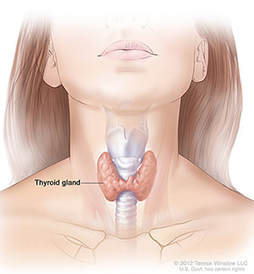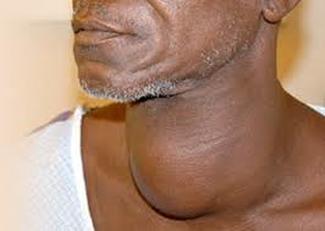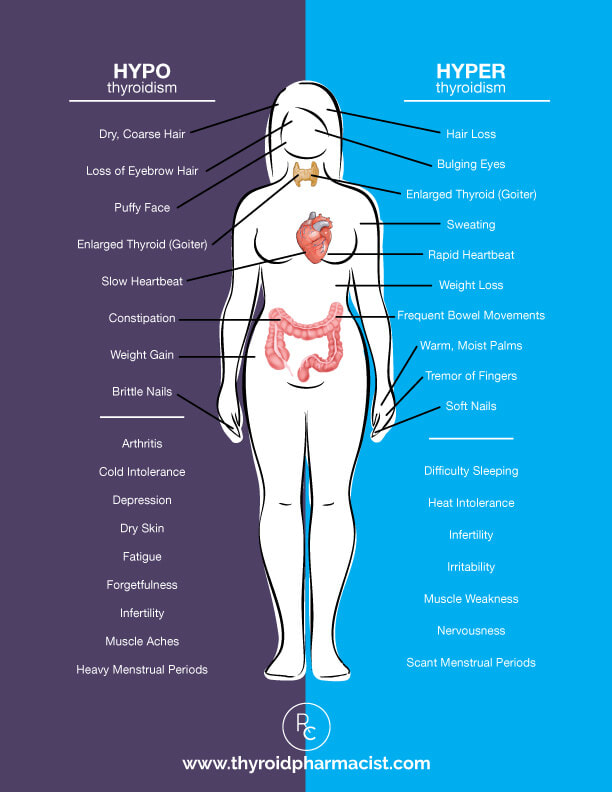|
HYPERTHYROIDISM
The thyroid gland is a butterfly-shaped gland that is normally located in the lower front of the neck, below the Adam’s apple. Hyperthyroidism is known as overactive thyroid; it occurs when the thyroid gland makes and releases too much thyroid hormone. Thyroid hormone plays a significant role in the pace of many processes in the body; these processes are called your metabolism. Thyroid hormone helps the body use energy, stay warm and keep many organs working as they should. If left untreated, hyperthyroidism can cause serious problems with the heart, bones, muscles, menstrual cycle, and fertility. RISK FACTORS You are more likely to develop hyperthyroidism if:
SYMPTOMS When there is too much thyroid hormone, many functions of the body tend to speed up. Some of the common symptoms of an overactive thyroid are listed below.
CAUSES Grave’s Disease The most common cause of hyperthyroidism is overproduction of thyroid hormone by the entire thyroid gland, known as Graves’ disease. This is an autoimmune disorder, where the immune system attacks the thyroid and causes it to make too much thyroid hormone. Overactive thyroid nodules Toxic nodular or Multinodular goiter is another cause of hyperthyroidism. This is where one or more nodules or lumps in the thyroid gradually grow and increase their activity so that the total output of thyroid hormone into the blood is more than normal. Thyroiditis Thyroiditis is inflammation of the thyroid gland that causes extra thyroid hormone to leak into the bloodstream. It may be due to a problem with the immune system or a bacteria or viral infection. At first, the leakage increases hormone levels in the blood, leading to hyperthyroidism, which may last for up to 3 months; afterward the thyroid may become underactive (hypothyroidism). Too much iodine The thyroid uses iodine to make thyroid hormone. In some people, consuming large amounts of iodine may cause the thyroid to make too much thyroid hormone. Some medicines may contain a lot of iodine, such as cough syrups and amiodarone (heart medicine). DIAGNOSIS Blood Tests The diagnosis of hyperthyroidism is confirmed by blood tests that measure the amount of thyroid hormones in the blood. These are Thyroid Stimulating Hormone (TSH), Thyroxine (T4) and Triiodothyronine (T3). If blood tests show that the thyroid is overactive, the levels of thyrotropin receptor antibodies (TRAbs) can be measured to determine if the cause is due to Graves disease. Thyroid Scan Your doctor may also want to obtain a picture of your thyroid (a thyroid scan). The scan can see how much of a radioactive substance has been absorbed. The size and shape of your thyroid is also examined, and indicates if the entire thyroid gland is overactive or if there are overactive nodules. TREATMENT The goal of treatment is to control the thyroid levels and make them normal, which relieves symptoms and prevents future health problems. There are several methods of treatment for hyperthyroidism. The best one depends on a person’s age, health, cause and severity of their condition. Anti-thyroid Medicines These treat hyperthyroidism by blocking the thyroid gland’s ability to make new thyroid hormone. Some of these include Methimazole and Propylthiouracil. Symptoms begin to improve in 6 to 12 weeks as your hormone levels adjust, but treatment can last for up to a year. Radioactive iodine Radioactive iodine is a common and effective treatment for hyperthyroidism. A pill or liquid with radioactive iodine is taken by mouth; it gets into the blood stream and is taken up by the overactive thyroid cells and destroys them. The result is that the level of thyroid hormone in the blood returns to normal. Symptoms often decrease in 3 to 6 months. The final result is permanent low thyroid activity (hypothyroidism), which is a condition treated with thyroid supplements. Surgery Hyperthyroidism can be permanently cured by surgical removal of all or most of the thyroid gland. After surgery, persons will likely develop hypothyroidism, which can be treated by taking thyroid supplements to restore the hormone levels to normal. HYPOTHYROIDISM Hypothyroidism, also called underactive thyroid, is when the thyroid gland does not make enough thyroid hormones to keep the body running normally. Hypothyroidism is the most common thyroid disorder; it affects women much more commonly than men. It generally run in families, and is more common among people older than age 60. SYMPTOMS Hypothyroidism has many symptoms that can vary from person to person. Some common ones are listed below.
CAUSES Iodine deficiency disorder The thyroid gland must have iodine to make thyroid hormone. Lack of sufficient iodine in the diet can prevent the thyroid gland from making hormones. The thyroid enlarges as it attempts to produce more thyroid hormone. Hashimoto’s Disease Hashimoto’s Disease (also known as Hashimoto’s Thyroiditis) is the most common cause of hypothyroidism; it is an autoimmune disorder. With this disease, the immune system attacks the thyroid; the thyroid becomes inflamed and can no longer make enough thyroid hormones. Surgery Some people with thyroid nodules, Graves’ disease or thyroid cancer, need to have their entire thyroid gland removed, and this can lead to hypothyroidism. Radiation Treatment Some people with Graves’ disease or thyroid cancer are treated with radioactive iodine for the purpose of destroying the thyroid gland. Also, patients with head or neck cancers are treated with radiation. All these patients can lose part or all of their thyroid function and develop hypothyroidism. Thyroiditis Thyroiditis is inflammation of the thyroid gland (usually caused by an autoimmune attack or by a bacteria or virus infection). Medicine Medicines such as amiodarone (heart medicine), lithium (bipolar medicine) and some cancer treatment medication can prevent the thyroid gland from being able to make thyroid hormone normally. TREATMENT The diagnosis of Hypothyroidism is made from blood tests (Thyroid Function Tests). Hypothyroidism cannot be cured, however in most patients it can be controlled. Levothyroxine is a thyroid hormone medicine that is identical to a hormone the thyroid normally makes. A blood test is done about 6 to 8 weeks after taking levothyroxine and the dose is adjusted if needed. Once you have reached a dose that is working for you, your doctor will repeat the blood test in about 6 months and then about once every year. Tip#1: Symptoms If you notice a goiter or swelling in the neck then you should see a health care provider. It could mean that your thyroid is underactive or overactive; it could also be a sign of thyroid cancer. Tip#2: (Hyperthyroidism) Stress management Stress may worsen thyroid disease. Exercise, mind-body practices like yoga and T'ai Chi, deep-breathing techniques, meditation and prayer are extremely effective at managing stress. Ensure that you regularly get adequate amount of quality sleep as this is important. Tip#3: (Hypothyroidism) Levothyroxine
I Hope these tips on THYROID DISEASE were helpful; Remember, Your Health Is Invaluable. By Dr. J. Lawarna Matthew Acknowledgements American Thyroid Association https://www.thyroid.org/hyperthyroidism/ https://www.thyroid.org/hypothyroidism/ National Institute of Diabetes and Digestive and Kidney Diseases (NIDDK) https://www.niddk.nih.gov/health-information/endocrine-diseases/hyperthyroidism https://www.niddk.nih.gov/health-information/endocrine-diseases/hypothyroidism Visit the links above for more information
0 Comments
Leave a Reply. |
AuthorDr. J. Lawarna Matthew Archives
January 2021
Categories |



 RSS Feed
RSS Feed
